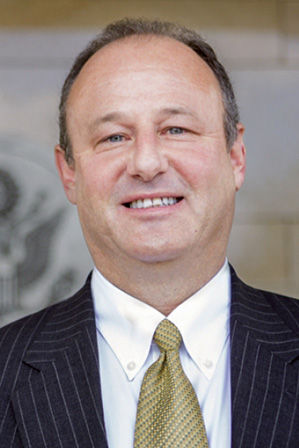Let’s Get It Right This Time
President’s Views
BY ERIC RUBIN

When I joined the Foreign Service in 1985, near the end of the last phase of the Cold War, the United States had a relatively clear set of goals and a relatively clear purpose in its foreign and security policies.
Of course, hazy nostalgia for a bygone era of bipartisan consensus on foreign policy is by no means justified. In the early 1980s, we had only recently put the tragic, divisive 20-year U.S. war in Vietnam and Southeast Asia behind us, and we found ourselves in an accelerating nuclear arms race with the Soviets and a widening global ideological division that would soon lead to proxy wars on three continents.
Our record during that “long twilight struggle” against tyranny that President John F. Kennedy referred to in his 1961 inaugural address is not error-free. We made many mistakes as a country as we battled Soviet communism and its imitators. But there is also much to be proud of—including the peaceful outcome of that struggle, which ended mostly on our terms.
I was privileged to be part of the diplomatic team that helped manage the U.S. response to the breakup of the USSR and its East European empire. I know from personal experience that those heady days had a downside: We were so swept up in the euphoria of ending the Cold War that we failed to make crucial decisions about our country’s future.
This failure was exacerbated by an understandable desire to reap a “peace dividend” after so many decades devoting much of our national wealth to the Cold War.
That in turn led directly to “doing more with less,” “reinventing government,” abolishing the U.S. Information Agency and the Arms Control and Disarmament Agency, and significantly pulling back from foreign engagement and commitments across the globe.
We are overdue for a serious debate about America’s role in the world.
This was not a complete pullback, of course. But in real terms, we began to cut both our outlays and ambitions to the point that today spending on diplomacy and foreign assistance is roughly half (in real dollars) what it was at the end of the Cold War—all while we are seeking clear motivating principles and goals for our foreign policy.
In the early 1990s, everything seemed to be going our way, and it appeared likely to continue without much effort or investment on our part. The “Washington consensus” encouraged us to believe that liberal, free-market democracy was the only game in town—and everyone would now have to follow it.
In many respects, things have not gone our way. I don’t need to lay out all the reasons why. I do hope, however, that we will consider the present time as a chance for us to think through what role we as Americans should play in the world, how much we are willing to pay for that role, and what the expectations are for other countries who want to share the journey with us.
We also need to recognize that U.S. global leadership in the 2020s cannot be a re-creation of our role in the past. We need to ramp up our global engagement, this time with the understanding that, as at home, there is no free lunch in world affairs.
AFSA is advocating that Congress provide more resources for the U.S. Foreign Service. We cannot keep doing more with less: We need to do more with more. We also need to temper our reengagement with a heavy dose of humility, recognizing that our country is going through a painful period of strife and division and that the world has changed. “Because we say so” is no longer a viable talking point, if it ever was.
We are overdue for a serious debate about America’s role in the world and what we need to do to achieve our goals. A clearer sense of national direction combined with adequate funding and staffing—and the resulting improvement in morale—would give the Service an opportunity to end the current decade in a much stronger place.
As always, I welcome your thoughts and recommendations. Please send them to us at member@afsa.org.

